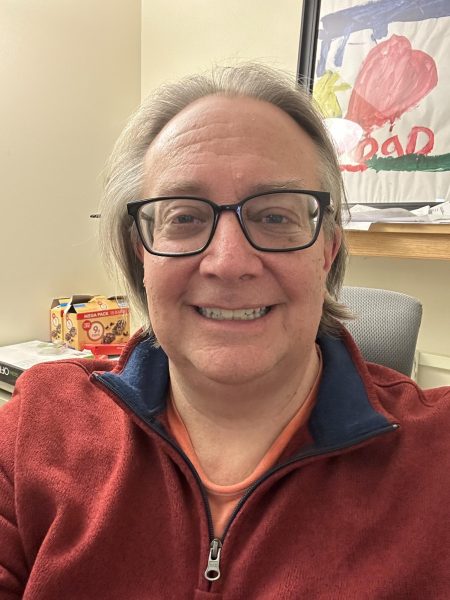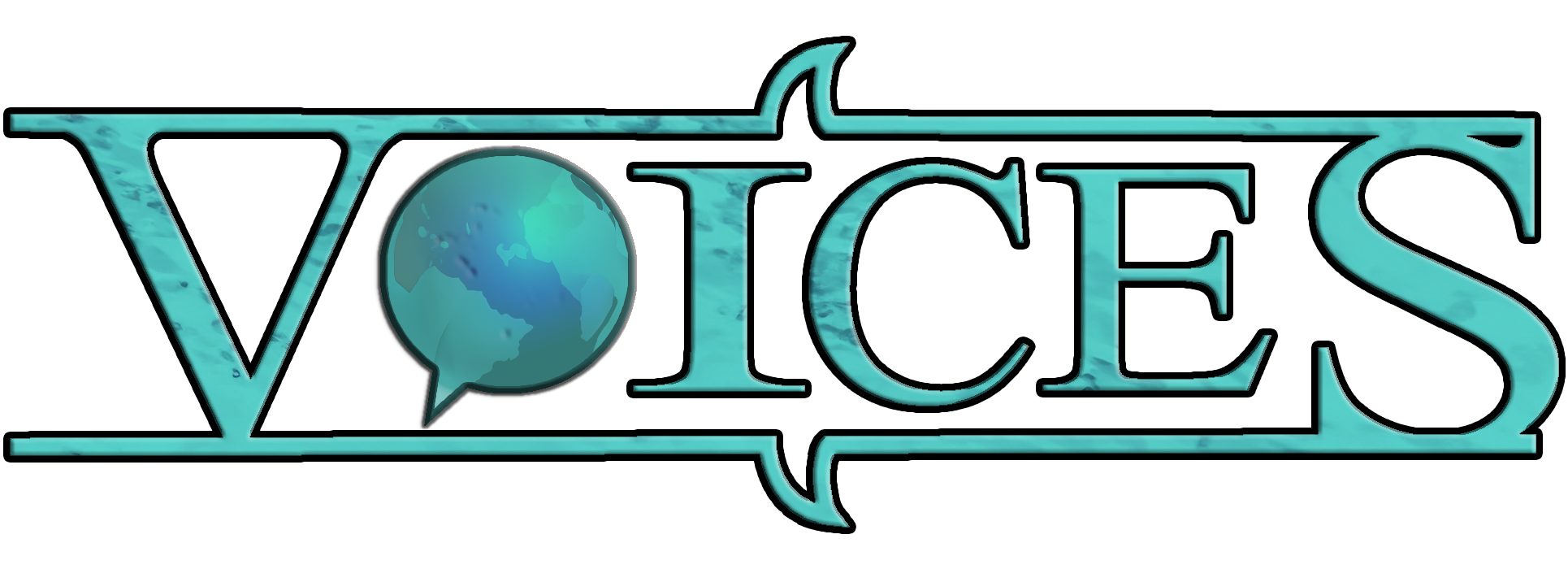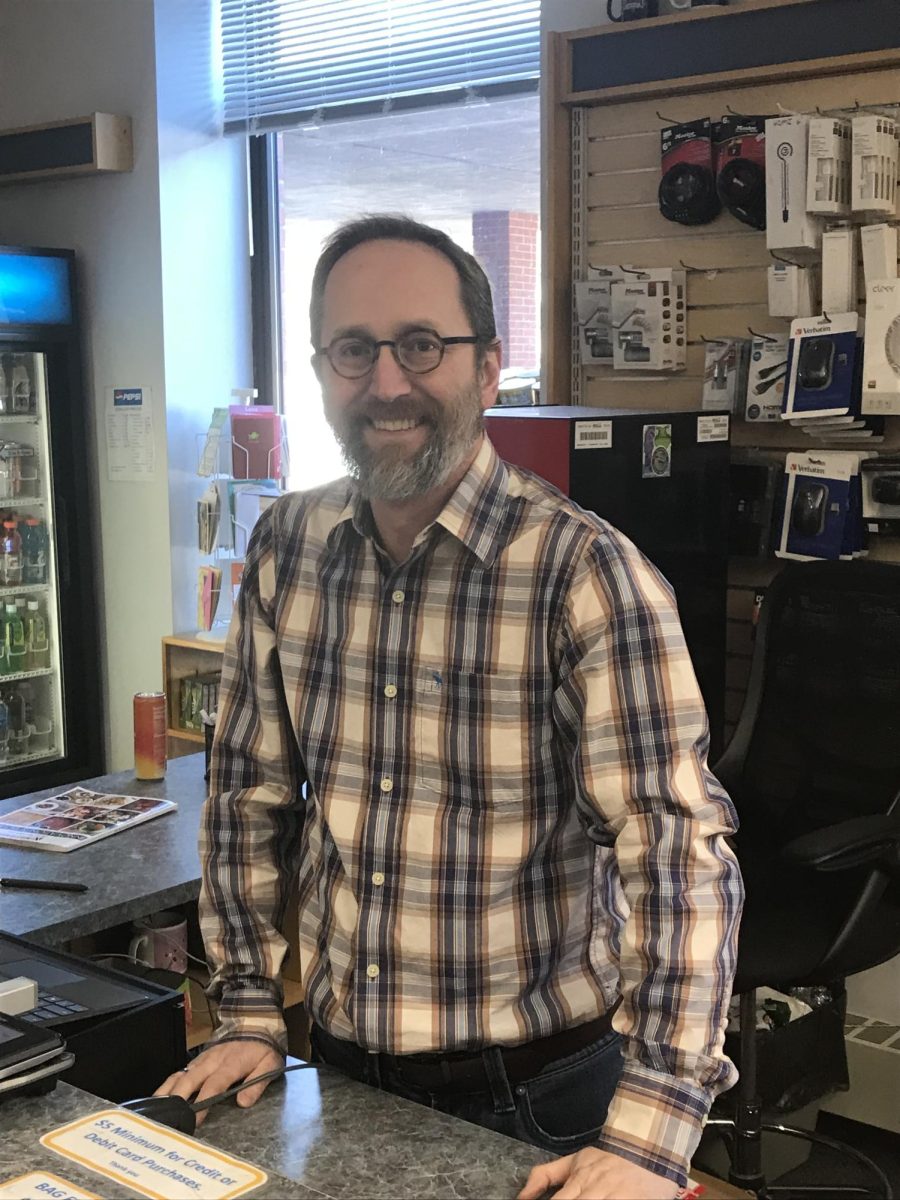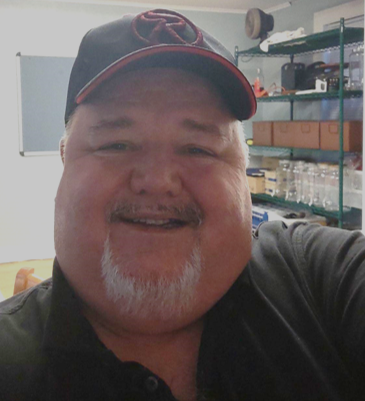
Editor’s Note: The following interview was originally aired on the “Sounds from a Distance” radio program and has been edited for clarity.
Introduce yourself.
Hi everyone. I am Josh Moyse. I am an assistant professor of theater here at Landmark College in Putney, Vermont.
So how did you get into theater?
I got into theater when I was young. I was probably five or six years old, and my babysitter was in a production of Alice in Wonderland on a commune. My mother took me to go see it on a warm summer day in this giant field. And there was about, I don’t know, 50 or 60 people to see the play. And we are just standing there waiting and, in my memory, the white rabbit comes running up toward us over the hill and stops about fifteen feet away and says, “I am late. I am late, I am late for an important date,” reaches down, opens a door in the ground, jumps into the door like it’s a rabbit hole, slams the door shut, and I was hooked.
Oh, that sounds amazing! They built it into the floor?
They built it into the ground outside. And this production had giant chairs and it had a giant floating chess board, and it was really kind of great. So that was the first time I saw theater and I really enjoyed it, but I did not get around to doing like theater until I was probably in junior high or middle school as we call it now.
Same. I really got into it like, not in junior high but high school. And that is like I have pretty much carried it over since then. So, what are some different jobs in the realm of theater that you have done?
I have done a lot of jobs in the realm of theater. I am obviously a professor at this point, so that I should probably list first. I have directed quite a bit. I have designed some. I’ve dramaturged. I have been an assistant director. I have acted. I stage managed once and they made sure never to let me do that again.
Never again <laughs>
There are some jobs you do not want to be good at and that would be one of them. And so yes, I have done a lot of things in theater. Like, if there is a theater job, I have probably done it. I have worked a little bit hanging lights. I have painted sets. I have done running crew, done sound design, set design, costume design. But some of that is out of necessity. Being in small town Vermont, I do not always have access to a lot of other people to work with so I end up doing a lot of it myself. Oh, and I’ve produced some plays, and adapted plays, written plays, you know, all that kind of fun stuff.
So, in all the jobs that you have done, are there ones that you prefer?
I am a director.
That is your preferred?
I mean, that is what my training is, director and teacher. Those are the two without a doubt.
So, what are some favorite works that you’ve directed or produced, and ones that you have been a part of?
That is an interesting question. I generally try not to watch the work I have done every night, as it is being performed. It is not something I generally enjoy because at a certain point–and I have gotten better about this the older I have gotten–at a certain point all I would see was the mistakes.
Yeah, I think it is kind of like the same thing where people who sing don’t like to hear their own voice.
Yep, that is true. So, I generally don’t go back to theater and think about it in that way. One of the things I like about theater is that it goes away and that it vanishes; that it is temporal. Like we people, whether we like to admit it or not, we’re only here for a certain number of years on this planet. So, I don’t generally go back and think about the plays I’ve really enjoyed doing that much.
I did a play last year based on Jekyll and Hyde that I adapted with my theater company in Brattleboro, which is “Shoot the Moon” and that was really, I thought, a little bit of a step forward. It was more mature. I could see I could see growth in there. So, I really liked that one in certain ways.
My favorite piece, in a lot of respects, is about 10 years ago now, I did an evening of Edgar Allan Poe’s short stories, and my wife was in–she’s an actress–was in a one woman show of The Masque of the Red Death, which is about a plague decimating a society, which of course once the pandemic hit became really on the nose, right? Like ohh, it’s tough to do that one right now. That one has a whole different meaning. But that one I really think is good. Like that I look at and I’m like oh, that’s it’s very simple. It’s clean. It’s high tech, elegant and it’s kind of chilling. So, I really like that one, even though it’s a really short piece. It’s only about 25 minutes. But that’s one that I try to bring back every couple of years or every few years. We haven’t done it since the pandemic, but I think we’ll probably try to do it sometime next year.
I’ve always wondered about one person shows. Like how does that work? It seems like it’s a lot since it’s only one person it’s a lot to carry?
Yes. <laughs> That’s fair. It’s a lot of memorization. I have directed, throughout my life, a ton of one person shows because probably they’re cheaper. Even though they’re not my thing, people approach me, “Hey, I want to do a one person show,” and so I started doing it in grad school and I have directed over a dozen to two dozen one person shows since then. And the actor, of course, has to be magnetic in that, and they have to know all their lines. But the good thing is they know if no one’s talking, it’s them. They know it’s not the other actor whose at fault, it’s me.
So, all the pressure is on you.
The pressure is all on them. So, I really enjoyed The Masque of the Red Death and, what was the other half of that question?
Is there anything you’ve been a part of that you enjoyed?
Yeah. Oh, a ton. I’ve had a really fortunate career on that level. I’ll just say a few things. I was an assistant to an artistic director at Sundance Theater Lab where we incubated new plays. And I was on their advisory committee for a little while. Advisory selection committee maybe a better word, I don’t know what the technical term would be there. I worked as an assistant director on Beijing Opera for years for about two or three years with people who had a really hard time politically even leaving China because they weren’t allowed the artistic freedom that we in this country take for granted. So that was really cool. I worked as an assistant director years ago on an all-women production of King Lear that toured Europe and won multiple NAACP Awards. The lead actress was African American. That was a ton of work. That one was really cool. I was an assistant to some other people along the way. I had a chance to work with John Barton, who was the founder of the Royal Shakespeare Company, and that was really cool. I remember those things.
So, from a theater standpoint I’ve been fortunate. I’ve been in the room with some of the luminaries of the industry. But those are luminaries from the serious theater industry. That’s not Broadway. That’s not the big, glitzy musical. This is, like, serious artsy theater and that really was. More of my taste. What?
What is the difference?
Money.
I mean, they’re both in the theater.
Yeah, but musicals tend to make money. They’re more enjoyable for some people, right? That’s cool. My wife was a musical theater actress when we met and that’s the expectation, is that it’s commercial theater. Musicals, not all musicals, but Broadway theatre is commercial theater. So, the expectation is that it needs to make money. So, if it needs to make money, it has to appeal to a broad cross section of the audience. That doesn’t always mean that it is as refined as some of the other things that I’m talking about where it’s more serious art. It’s more of an individual vision.
But then sometimes you get individual visions that break out. Hamilton is a very individual vision that breaks out. Which is cool, right? But, if Hamilton were not a musical…has to be, right? The whole premise of it is that it’s hip hop and it’s a musical. So, they have a different kind of baked in audience.
So is there anything that you haven’t done that is on your bucket list?
Let me think about that for a second.
Or have you done every single job that could possibly be offered in the theater?
No, no. I just like doing what I’m doing as a director, in particular, and a teacher, because these are longer careers. You may or may not know this, but I’m a huge basketball fan.
Yeah, we know. You have told us multiple times.
So. I’m a huge basketball fan. The greatest basketball player is LeBron James right now. He’s been playing for 21 years and people’s minds are blown that he’s in his late thirties and he’s playing basketball still. Tom Brady was the quarterback for the Patriots. He played until sometime in his 40s.
And then retired and then went back.
So what I like about being a theater director and theater professor is that I’m curious–like I had this thought when I was much younger in my 20s, when I was around your age–I’m curious how I’m going to be at this when I’m 80 doing it, because I get 60 years of honing my craft, which is pretty special. There aren’t many careers that you can have and do for that amount of time and devote that amount of energy to. And being a professor and being a director is one of them.
I haven’t considered some of the things you’re asking me about for 30 years, 40 years, right? But if I sit here and I think about the first play I directed when I was in 11th grade, when I was 17, and I think about what I’ve grown now to, I can see the growth of my craft in directing, but I can also see that my impulses when I was 17, artistically, are still my impulses now. I’m just maybe refining or figuring out or exploring different ways to dramatize them or make them more…whatever that more is. For me, often it is more elegant and more simple. I find elegance and simplicity the most beautiful things, generally speaking. So that’s the thing that I’m pursuing. But as far as like, do I want to go direct on Broadway? I never wanted to direct on Broadway. That was never what my focus was when I was a director. Would I maybe like to direct some new plays that someone has written? Sure. But overall, I’m content.
I know you said you’re not an actor, but because of the current actors’ and writers’ strike…well the writers’ strike is over, the actors’ strike is still ongoing…in the realm of theater, have you ever been there through a strike or seen multiple strikes like this.
No.
Do they tend to go on strike?
Equity actors? They don’t really strike, no. And I have become–you have talked about acting–I have been for the last however many years teaching acting. 10 plus years…15 years I’ve been teaching acting. I’ve gotten to be a good actor, I think, or at least a much better actor than I was before I was teaching acting.
We all in some way come to theater through acting. That’s not the only entry point. But it’s the most common entry point. So, when I was doing that in high school, I never really enjoyed acting. I wasn’t very good. I was OK sometimes. Once, maybe I had one or two good moments. But no, I wasn’t an actor and that wasn’t what I enjoyed. But what I did enjoy was the theater. And it wasn’t until I found directing in 11th grade that I was like, oh, this is where I should be. And it felt like I was just putting on my sneakers.
So it felt comfortable?
It totally was. It’s like breathing.
Some people are not lucky enough to find the thing that they’re immediately drawn to, especially as early as you were.
I remember being in my 20s and seeing some of my friends who I’d known for years at that point and they didn’t know what they wanted to do yet. And I was like, well, what I want to do is really hard and there’s not a lot of money in it, but at least I know what I want to do. I’m not like sitting there thinking, oh, do I want to be a communications major? Or do I want to go into finance or equities? I was lucky.
And being in theater has sustained me in life, has given me a life. I wouldn’t have met my wife if I wasn’t in theater. I don’t know what my path would have been if I did not find theater when I did. I hated school. I used to miss dozens of days a year. Up until a certain point, they would try to have me stay back, but I was always smart enough. I was getting good grades, but I was missing so many days. I just found school awful. And it wasn’t until I had to go to rehearsal after school, in like ninth grade or eighth grade that I started showing up regularly.
What were you doing? The days you just weren’t in school?
There was a lot of daytime game shows back in that era.
So, you just stayed at home and watched Wheel of Fortune?
No, we didn’t get CBS, man! We lived in the country at that point. I don’t remember what I would watch, and maybe it wasn’t as many as I remember, but I had no affinity to school, and I wasn’t particularly good at anything. Or I didn’t think I was good at anything until I found the directing in theater. And then I was like oh, I like this. I’m good at it. And all the girls are paying attention to me now.
That’s always good.
You know, what else are we looking for here?
So, do you have any advice for anyone who wants to get into theater?
You’ve been in my classes, and you know we joke about this in my classes. First of all, if there’s nothing else you want to do, pursue theater. If there’s a glimmer of anything else you want to do, do that instead. Really, I’m being sincere here.
I’ll give you an example. My wife was an actress when I met her, and I didn’t know this, but she had almost gone to be pre-med. Her family are doctors. Well, she is now a nurse practitioner. She’s not a doctor, but she’s now a practicing medical person. But it took her 35 years to come to that point, and she’s performing for fun and enjoyment, and staying active and singing and dancing and acting and all that stuff. I never knew what that other thing was. I never had that other thing, so it never even entered my mind what other thing was like. There was a moment where I was like, I’ll be a law student, because I was a PoliSci major, too, and that lasted like one class. PoliSci is fine, but pre-law is terrible.
So, if you want to go into theater, the most important thing is who you know, and that doesn’t mean you have to know someone famous. That helps, but you want to know who you’re working with, because theater is a collaborative effort. The people you work with are your community and the people who support you through the good times and the lean times. You have to really form a community of people to work with. It’s very hard to be an aspiring actor or actress, get off the bus in Port Authority, New York City, or down at Union Station in LA and just be like, I’m here and now pay attention!
World, do something for me!
Right. If you do go to those places, absolutely cool, not a problem, but you need to find a community that supports you and you’re comfortable within. Just like here, right? We all come here because it supports us and we’re comfortable and it allows us to grow. You need to find that in theater.
So even though you’re maybe auditioning against these people, you need to find a way to do that. Because if you find that community, you’ll do work when you’re not getting work if that makes sense. Like, you’re going to go out for auditions, if you’re lucky, for a TV show or a soap opera. I’m not saying you’re going to get it. But you need to have a community of people who you can work with, a theater company, any friends who you do theater with, so you can keep yourself active and maybe even get noticed; because one of them might become famous or well-known and then say hey, you know what?
Hey, do you remember me?
Or you know who would be really good for that role, right? So, you can’t do it solo. You have to be with people.
What you said about not knowing what the other thing is, I think I kind of have that; like this– specifically acting–is what I want to do. I came to college because I hoped that maybe through taking different classes I would find maybe what is my Plan B? Which is why I pretty much took communications, because if I don’t do acting I think I have very strong…what’s it called, oratory skills?
I think you do. So, just to be clear, theater is not necessarily acting. You could act in film or camera work and all that kind of stuff. If you’re really wanting to be an actor, my advice is you get out to the West Coast and you try to you find a community there. I know that’s scary and stuff, but why do I say that? Because you’re going to get paid.
Like theater, you could do a regional play, which is a big gig as an actor. You could play Lady Macbeth. Or you could play…
Macbeth.
…Macbeth. Hey, in my production you would be Macbeth. You’d be like, alright, I’m on top of the world, at one of the top theaters in this country and I’m doing it for six weeks and I’m getting maybe $5000. Whereas you could be like, I’m going to be in the new Pizza Hut commercial and I’m going to make maybe $5000 for the afternoon; or if you’re union, you might make $15,000 for the afternoon or $50,000. Even though the theater world of LA is second class citizens, because it is an industry town, that’s the place if you want to really go work and try to make money, that’s a good place to go, or even maybe one of the smaller cities where you could maybe have a chance to meet people and get noticed because New York is tough. I was born there. I grew up there. I went to college there. New York is tough.
Obviously apart from working in theater, you’re also a teacher. So how did you end up here? What’s that story?
Well, you’ve heard this one, I’m sure, but I’ll tell you. My wife and I, we were in our 30s when we had our son, and I had a choice. My directing career was going well. I was directing a play in Los Angeles. I was co-directing a documentary. Both of those things turned out really well, but I had a chance to be a sabbatical replacement at Marlboro College for, I think, it was a semester. So, I was like yes, I will go do that because I realized I could either keep directing and seeing my kid less and less—and he was just born. Because the more successful you get as a director, the less time you’re at home. I was based out of LA at that time, flying to New York. I’m flying to a different city, whatever, I’m not going to see my kid. Or I could try to teach more–at that point, I taught very little–and I could spend more time with my kid.
So, I took the job at Marlboro. And then I was in the area and I started trying to get to know all the community theater people, because that’s all there is for theater in this area. Vermont Theater Company asked me to come do an audition workshop for their actors and I agreed. It was some March, really nasty weather day, and I woke up and I was like, I don’t want to go. My wife’s like, no, you’ve got to go. You committed, so you got to go. So, I went and I didn’t realize it, but I wasn’t going to be the only one on the panel. And so I gave a little bit of talk about who I am. I have my MFA from this school. My BFA from that school, blah blah blah, and we did the audition workshop for about an hour and 10 minutes, and then whoever was running it said let’s take a break now. And the lady who was sitting next to me, very nice woman, I didn’t really know her at that point, turned to me and goes my name is Adrienne Major and I work at Landmark College and we’re looking for an acting teacher, and you should apply tomorrow. I’m like, yes, I should. So that’s how I wound up teaching here. But I really started looking for teaching because I wanted to be more around my family, particularly my son, as he was growing up.
So, there wasn’t a theater department before you came?
There still is no theater department, just to be clear. There’s an arts department. A department usually has more than one person and has resources dedicated solely to itself, so money, budget, right? So, the theater department would get this, the photography department or the film department would get that. We don’t have that. We’re a small college, so our departments are larger. We don’t have a music department or a theater department. We have an arts department.
So, when I started working here in 2013, and I taught acting–and that’s acting I, which is staggeringly similar to the class you took, a lot of the same stuff–they must have liked me because they kept asking me to come back, and they kept offering me more and more classes. But they didn’t offer me a full-time position. It’s a long, long story, but eventually they were like, there is a full-time position opening, you should apply for it. And I did and that’s how I’m sitting here with you.
So it’s a lot of work because you do teach different classes.
Oh yeah, but if you’re going to have a theater professor, rather than a theater department, you want to hire a director. And the reason is that a director in graduate school–and we all have to have terminal degrees, I have a Master of Fine Arts–in graduate school directors, for the first year, we take all the classes with the actors. The second year we take all the classes with the designers. And so, we’re learning about all the disciplines in addition to directing and theater history.
God bless actors, but an actor will have multiple years of acting, multiple years of speech, multiple years of voice, multiple years of movement, for example. A director will have one year of speech in graduate school, one year of voice, one year or two years of movement, multiple years of acting probably, and then we’ll have multiple years of design, multiple years of theater history. So, we have a much more general viewpoint, and that’s why I teach acting.
The punchline is, guess what I don’t teach? Directing! I don’t teach the thing that I’m probably best at. Actually, I’m teaching writing for the screen in the spring, and I’m really good at that. That’s a whole other story. But because I was trained as a director, I’ve had six or seven years of actor training, that was my undergraduate degree as well. I’ve had 7 to 8 years of theater history. So that allows me to teach Acting I, Intro to Theater Appreciation, Acting for the Media. Guess what I did when I lived in Los Angeles as my side gig to make money?
Acting
Film. I worked in film and so I did all this film work to make money. And you know I made movies before I even went out to grad school. I made a horror movie stuff and stuff…
And you said you have things that you’ve directed that we will never find.
Well, that’s because they’re gone. The horror movie you could find I’m sure if you really wanted to. I don’t necessarily recommend it, but you know, it’s to each to each their own personal taste. That’s 25 years ago in my life. I’m such a different person, you know, on some level anyway. So yeah, that’s how I wound up here. There are things, and we haven’t hit that point yet, like if they asked me to teach a costume design class, because I know we have some students interested in costumes design. I’d be like that’s just a bridge too far. I cannot do it right. You want me to teach the principles of design in a kind of introductory way? I can do that. But if you want me to teach you how to design a lighting plot, that is not going to be where I am best suited. I try to know where my limits are.
All right, Sir. Well, thank you for taking time out of your day to have this interview with me. We finally found time. I’m so thankful for that.
It’s wonderful to see you. I’m so glad you’re doing this. And thank you so much for having me.






